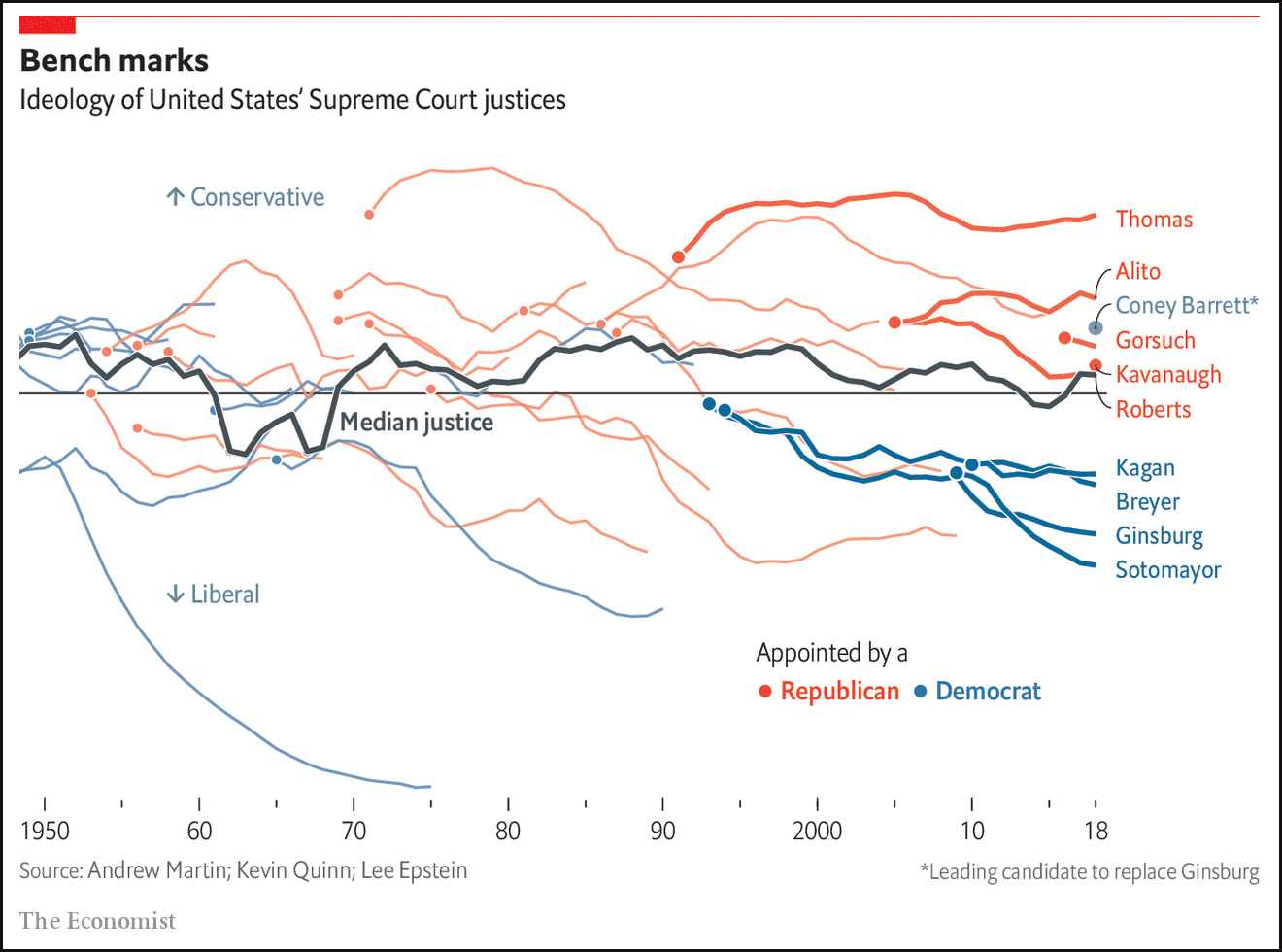
Kevin Drum
Here are a few notes related to yesterday’s post about the (non) decline of democracy.
- It should be possible to view something as appalling without also insisting that it portends the end of democracy. There are lots of appalling things going on today, but this doesn’t mean that democracy is withering on the vine.
- We do not face a hostile Supreme Court “for the next 40 years.” Clarence Thomas is 72. Alito is 70. Roberts is 65. There’s a good chance that a Democratic president will have a chance to replace one or more of them sometime in the next 10-15 years. What’s more, even after Amy Coney Barrett joins the court it will likely be no more conservative than it was during the ’80s.

- Republican control of the Supreme Court is not due to anti-democratic forces. It’s due to the fact that conservatives have worked on it a lot harder than liberals. (Plus they got a bit of luck.)
- Even after four years of Donald Trump, the rest of the judiciary is split about 50-50 between Republican and Democratic judges. This is less than Republicans have typically enjoyed over the most recent few decades.
- Republican voter suppression tactics are loathsome. However, they are an act of desperation, not power, and they’ve had very little effect. They succeed in keeping some people away from the polls, but they also produce a backlash among Democratic voters, who show up in greater numbers. On net, the evidence suggests that their effect is zero or just slightly positive.
- Since 2000, Democrats have controlled the Senate for 10 years vs. 10 for Republicans. They have controlled the House for 6 years vs. 14 for Republicans. Meanwhile, the presidency has rotated normally. And voter turnout has increased from 52 percent in the ’80s and ’90s to 55 percent in the aughts and teens. There are no signs in this that democracy is withering.
- The Electoral College is anti-democratic, but there’s nothing new about it and it represents no trend. Ditto for the Senate. Nor is there anything new about the fact that both of these institutions slightly increase the importance of small states, something that competent party leaders have always known.
- Stop being complacent! We’re facing a crisis! We have a minority president who wants to rule forever and deliberately incites racial violence to help him do it. But we’re always facing a crisis. The War of 1812 was an existential crisis. The various expansion compromises over the following decades were crises that enabled the inexorable spread of slavery. The Civil War was a crisis that produced a suspension of habeas corpus. The violence of the early labor movement was a crisis that spawned Army attacks on US citizens on American soil. World War I was a crisis that led to the Palmer Raids. The Great Depression was a crisis that precipitated World War II. World War II was a crisis that produced detention camps for citizens of Japanese ancestry. The Cold War was a crisis that gave us HUAC and Joe McCarthy and Vietnam. The counterculture ’60s were a crisis that spawned COINTELPRO. The stagflation of the ’70s was a crisis that led directly to the election of Ronald Reagan—who, at the time, was viewed by liberals the same way we view Donald Trump today. The terrorist attack of 9/11 was a crisis that gave us the Iraq War. And now Donald Trump is a crisis.
- It’s hard to take past crises seriously because we know how they turned out. For example, in 1933 many liberals supported the idea of FDR adopting dictatorial powers (a “benevolent autocracy”) to fight the Depression. It was a serious possibility, and certainly far more anti-democratic than anything going on today, but because FDR eventually rejected it the whole thing seems like little more than a tidbit of trivia today. Our crisis, by contrast, still hangs in the balance. But that doesn’t mean it’s more serious than the others.
- The anti-majoritarian institutions of the Senate and the Electoral College are minor sideshows. The problem with the United States right now isn’t a lack of democracy, but perhaps too much democracy. We remain a 50-50 nation, and our government reflects that a little too well. If we want to get moving again, one side or the other needs to win over a solid, steady majority of voters to its side. It’s weak public support that’s prevented adoption of the progressive agenda, not a vote or two in the Senate.
More globally, my own personal fear about declining democracy centers on China. That may seem odd, since China has never had a democracy in the first place, but it’s long been the hope of westerners that rising living standards and greater engagement with the rest of the world would move China in the direction of accepting democratic reforms. That hasn’t happened. In fact, it’s been just the opposite. To the extent that China demonstrates that a country can be harshly authoritarian and enjoy long-term economic success, it sets a model that will be all too appealing elsewhere.
UPDATE: I’ve deleted a bullet point about anti-democratic actions at the state and local level. On second thought, it was wrong.


















